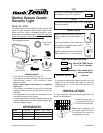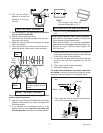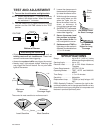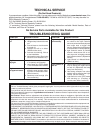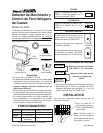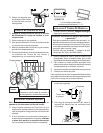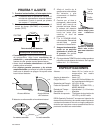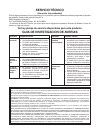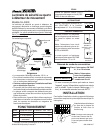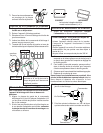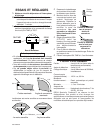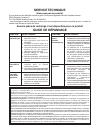
2
595-5496-06
WIRE THE LIGHT CONTROL.
❒ Turn the power to the lighting circuit off at the
fuse or circuit breaker box.
❒ Remove the existing light fixture.
❒ Strip about 5/8" (16 mm) insulation from the exist-
ing junction box wiring.
❒ Route the Light Control’s wires through the large
hole in the gasket.
❒ Twist the junction box wires and fixture wires to-
gether as shown. Secure with a wire connector.
For proper operation and safety, the light fixture
must be above the sensor.
❒ Align the Light Control cover plate and cover plate
gasket and the junction box. Insert and tighten the
mounting screws.
❒ If not installed on a weatherproof box or if an
adaptor plate is used, caulk the wall plate and
mounting surface with silicone weather sealant.
MOUNT THE LIGHT CONTROL.
Cover
Plate
Gasket
The halogen light must be
mounted horizontally (+/- 4°).
RIGHT WRONG
BULB INSTALLATION AND RELAMPING.
❒ When re-lamping, turn power off and let the fixture
cool.
CAUTION to avoid fire or burn hazards:
• Allow fixture to cool before touching. The bulb and
fixture operate at high temperatures.
• Keep fixture at least 2" (51 mm) from combustible
materials. Do not aim at objects closer than 3 feet (1 m).
• Re-lamp with type T 300W (or less) halogen 120
VAC lamp only.
❒ Drill out the holes if
needed to mount the
backplate to the junc-
tion box.
Black to
Black
White to
White
❒ Rotate the sensor head towards the clamp screw
joint.
Clamp Screw
Controls
❒ Then rotate the sensor head counterclockwise
180° so the controls face down.
Controls
Junction box ground wire
to green ground wire on
fixture.
❒ Remove glass cover and remove the old bulb by
pushing the bulb towards the right until the left side
of the bulb is clear of the left socket.
❒ To insert the new bulb, push the bulb into the right
socket so the bulb fits completely into the left
socket.
❒ Check that the bulb is seated properly.
❒ Re-install the glass cover.
For under eave installation, the sensor head must
be rotated as shown in the next two steps for proper
operation and to avoid the risk of electrical shock.



